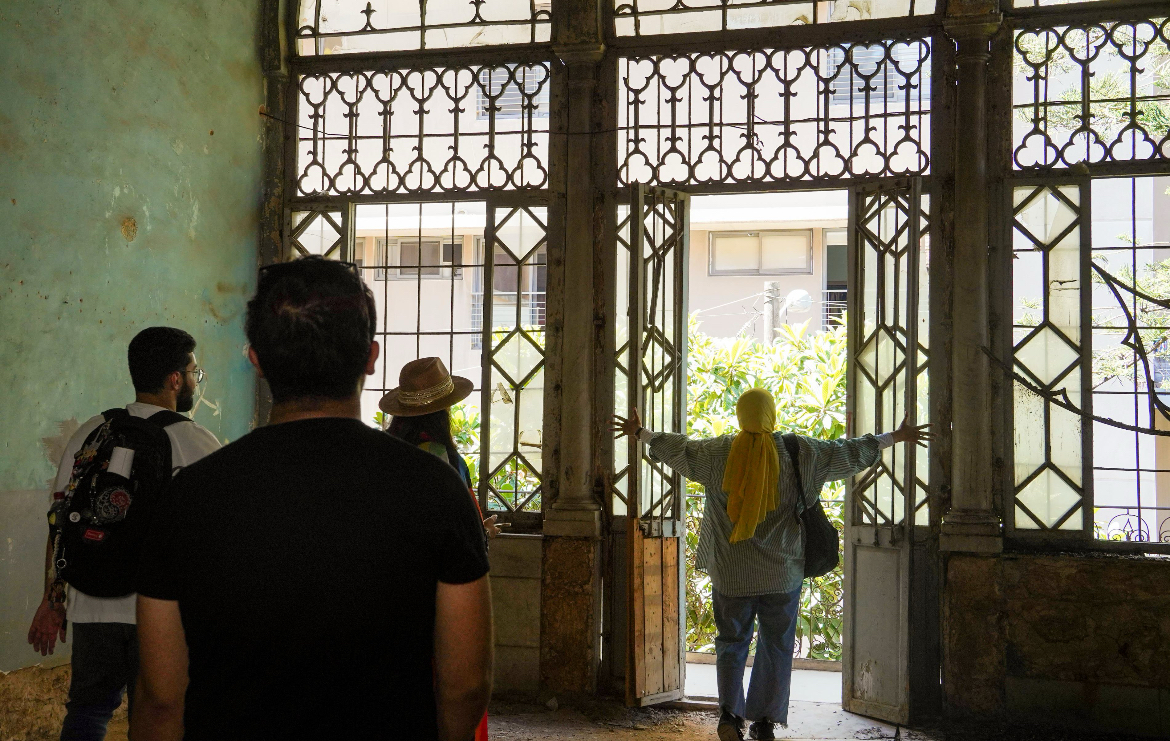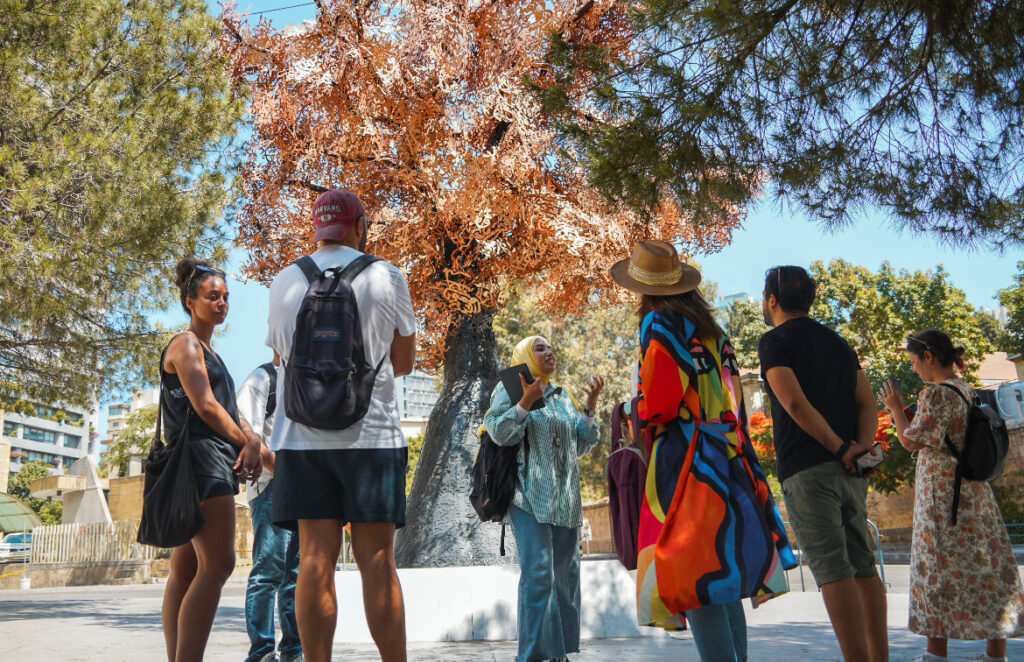
How a young Lebanese woman transformed her life for the love of her country: seen through the eyes of others
Samira Ezzo, twenty-seven years old, never anticipated being where she is in life today. Growing up in Beirut, where she attended the Lebanese University to study English Literature, she had an affinity for people, adventure, and discovering new places.
“I didn’t have a lot of money as a weekly allowance, so I was always on the lookout for free and affordable places,” Samira told NOW.
Her career’s path seemed straightforward: she would graduate, become a teacher, and then LRC Coordinator (Learning Resources Center Coordinator) at al Hayat International School where she worked for three years, organized workshops, and honed her management and teaching skills.
However, she cultivated a side passion she has never given up on: organizing tours. She used to do that every Sunday with a commercial agency, not a touristic agency,meaning they were not licensed to give tours. However, Samira was unaware of this at the time. She just wanted to share her love for touring around the city and discovering hidden gems with other people.
Eventually, Samira left all of this behind and embraced a new life, giving her own tours and becoming popular on Instagram as @samirablogs, where she shares her adventures, places to eat, recommendations on where to go, and what’s hidden across Lebanon, particularly in Beirut.
The beginning
Samira began using her Instagram to post about modest fashion around 2015-2016 and shared photos of her visits to various coffee shops. Keeping up with trends, she started uploading reels when they became popular.
“I was very curious about heritage houses and wanted to share videos of them,” she said, highlighting that one of her favorite hobbies is urbexing, the exploration of manmade structures, usually abandoned ruins or hidden components of the architectural environment.
However, she emphasizes that she only does it with her husband and advises people to explore with company as “incidents can occur,” recounting how she once fell into a sand hole she hadn’t seen.
Through her urbexing adventures, Samira unraveled the mystery of traditional Lebanese architecture and sometimes witnessed its destruction.
Regarding her social media career, Samira thought it would be a good idea to introduce people to new restaurants, people, secret gems, and more. “I remember my childhood, where we used to go to gardens and open spaces with my family, and wanted to see if I could share some of these places with people online,” she said.
Samira was heavily inspired by her upbringing. Her dad, an antique trader from Nabatieh who learned his profession from his maternal uncles from Damascus and opened his shop in Basta Tahta, was surrounded by people his whole life, which helped young Samira develop her social skills and learn how to communicate with others early on.
“I don’t like staying at home a lot, so I’m always walking around trying to discover places, and it’s honestly amazing how much you can learn about people just by asking a few questions,” she confessed.
Starting new
Samira’s love for giving tours was growing stronger, and she knew she needed to follow this calling. She quit her side job with the company and aimed to become a licensed tour guide. However, the only way to achieve this was by enrolling at the Lebanese University, where she had to complete specific courses to graduate and become a licensed guide.
“The market is oversaturated with unlicensed guides, and I wanted to make sure I was doing my job to the best of my ability,” she said.
Quitting her full-time job at LRC and her side job meant she needed a new source of income, and social media was not sufficient.
“People may not know that to start and build themselves on social media, they need to spend their own money, and even then, there might not be a lot of revenue from social media,” she said.
So, she took the tour she had been giving with the company, called the ‘Green Line Walking Tour,’ and continued it under her new tour guide initiative, Layers of Lebanon.
The Green Line refers to the line of demarcation in Beirut, Lebanon, during the Lebanese Civil War from 1975 to 1990. It separated the mainly Muslim factions in West Beirut from the predominantly Christian East Beirut controlled by the Lebanese Front. The Green Line was a vulnerable point for both West and East Beirut.
“I needed to do a lot of my own personal research and reading to obtain an objective view of this line and the historical events of that time period,” she said.
For Samira, the period of the Civil War is shrouded in mystery, which she wanted to unravel. She used to listen to stories from her family members, especially elders, about the old times in Lebanon and how things changed, particularly during the civil war.
“It is not dark tourism because we also focus on heritage buildings and how Beirut evolved and changed over the years,” she said, adding that she also focuses on traditional crafts and artistic sites to share with the participants.
The tour lasts five hours and visits several places, including the Lebanese Army Martyrs’ Monument, Grand Famine Square, Achrafieh, Beit Beirut Museum, the antique district, Basta Tahta, and Martyrs’ Square.

Photo by Dunia Suboh
Hopes and aspirations
Although most of her work on social media doesn’t pay much, Samira continues because it ties into her aspirations to grow her tours and reach different cities in Lebanon.
“In Lebanon, there should be governmental support to help inform licensed guides on how to market and promote themselves because it is essential in the age of social media,” she said.
She has come a long way from simply taking her cousins out or spending time with her family, especially her dad. Samira discovered her love for guiding tours not too long ago, and she is happy with how her life has unfolded to help her reach this point. “It makes me sad when I look at Beirut and see how it was completely altered after the civil war because of Solidere,” she said.
Solidere (an acronym for Société Libanaise pour le Développement et la Reconstruction de Beyrouth) has directed the redevelopment of Beirut’s city center for the past two decades, managing the postwar reconstruction of nearly 200 hectares. This effort has not been without controversy.
Solidere is accused of using harassment and intimidation to drive the original residents out. Former residents and business owners were compensated with shares in Solidere, rather than cash, at what many claim was well below the true value. Owners had the option to keep their property and return the shares, but only if they had sufficient funds to restore their buildings in line with Solidere’s strict preservation standards – too onerous for most to manage.
Solidere’s takeover meant that the face of Beirut, its traditions, and its history in the city center have changed forever. “Which is why I incorporate narrative storytelling and oral history so that people know more of Beirut than just the popular shopping places,” Samira added.
One of her favorite places is Tripoli, where Samira goes whenever she needs respite from Beirut. Now, she still works on her social media and posts regularly, always introducing new places, shops, restaurants, or stories to her audience. She hopes that one day, she will be able to give guided tours across Lebanon.








